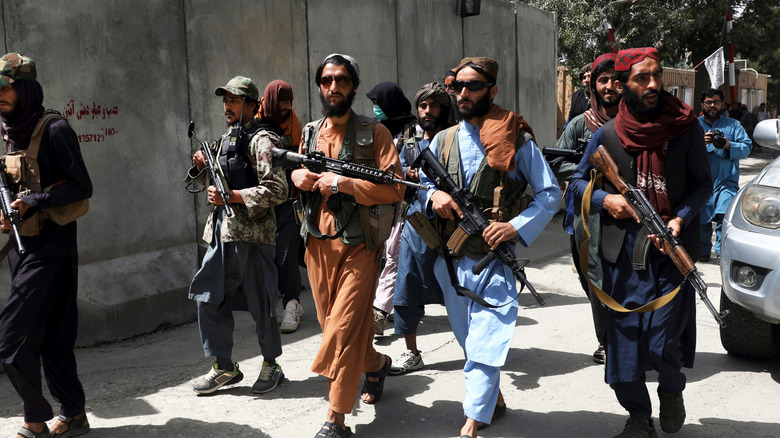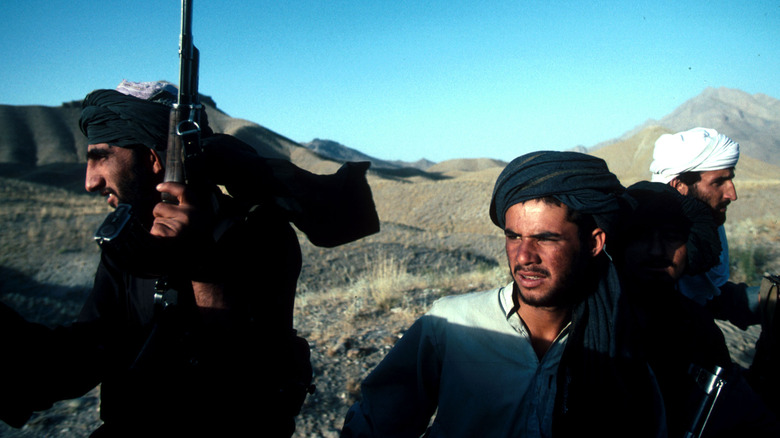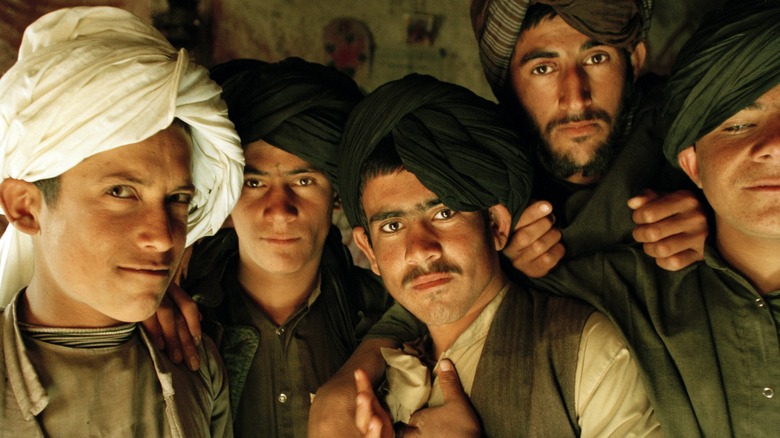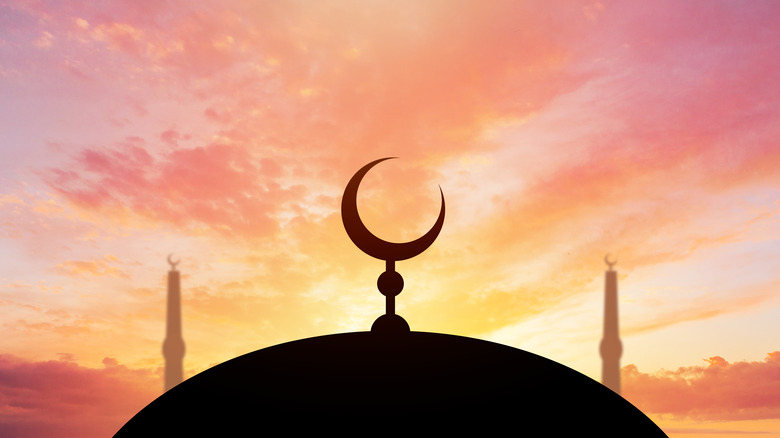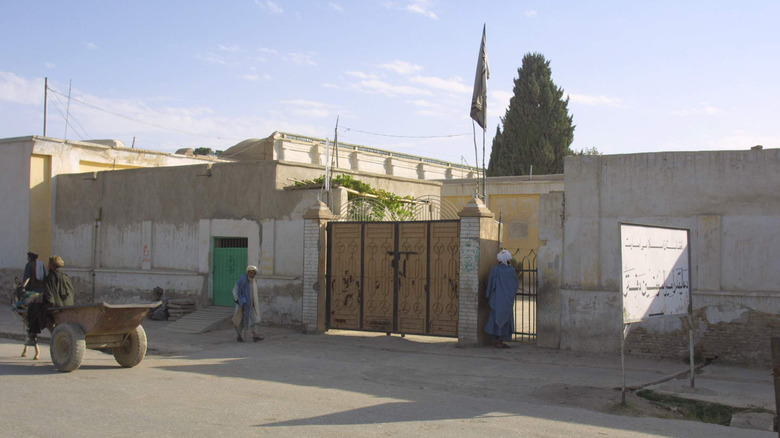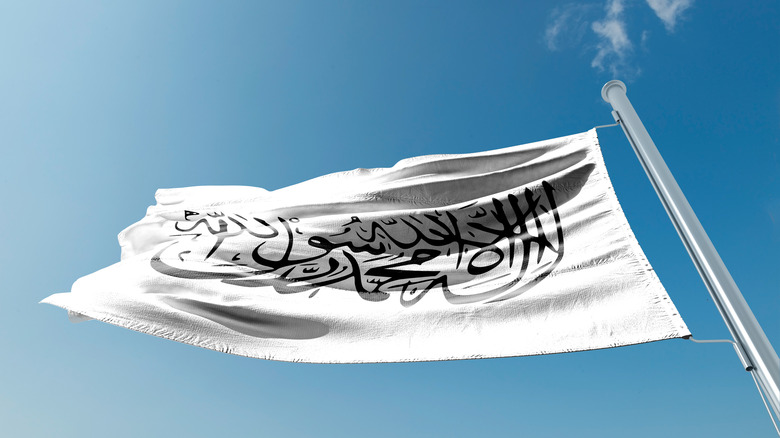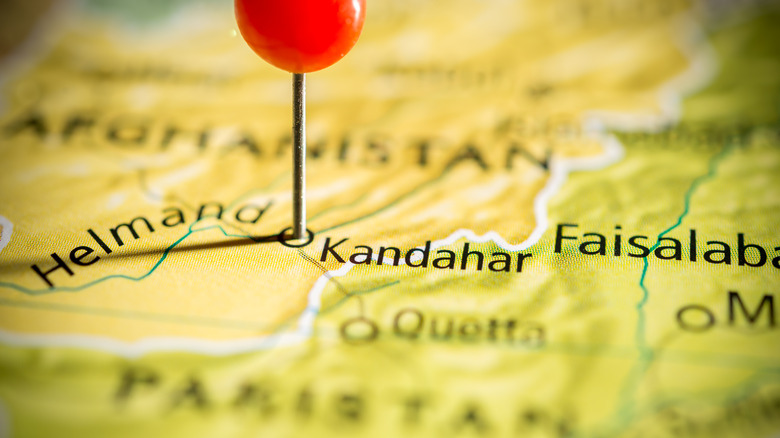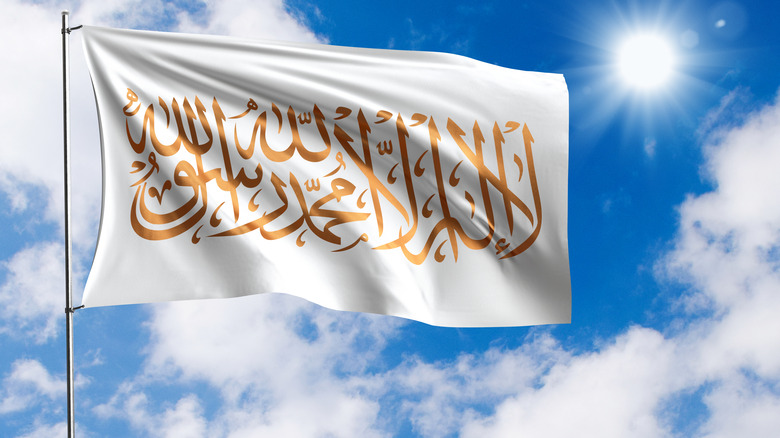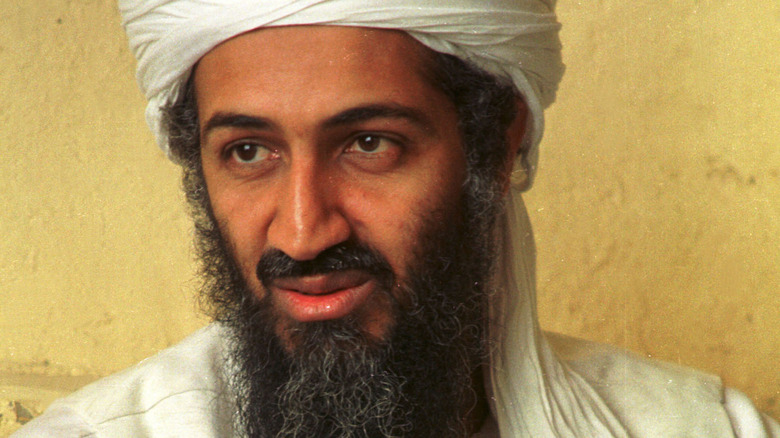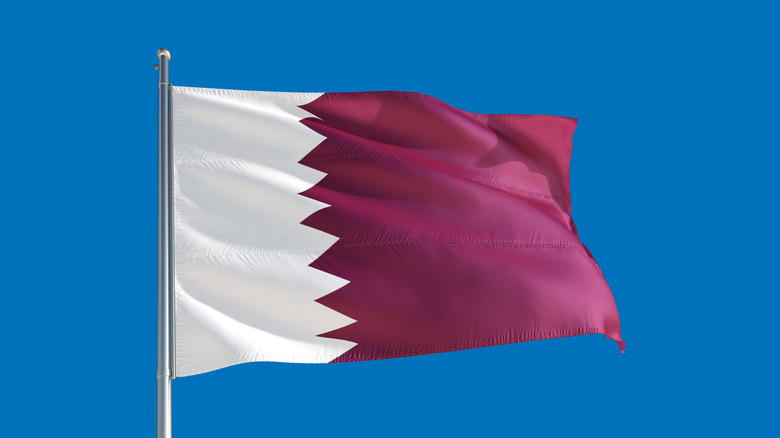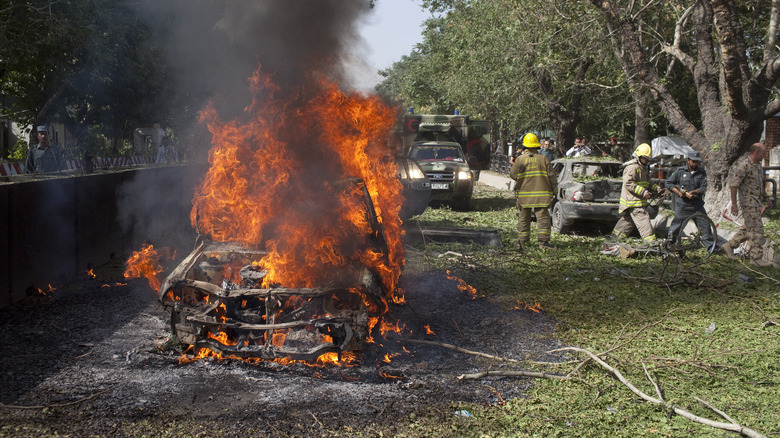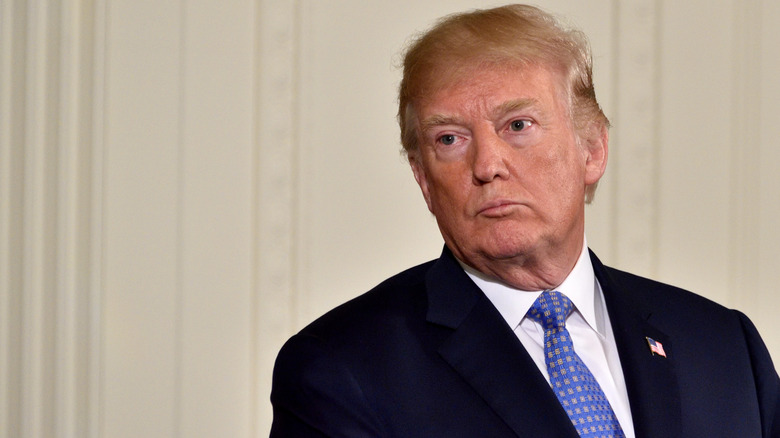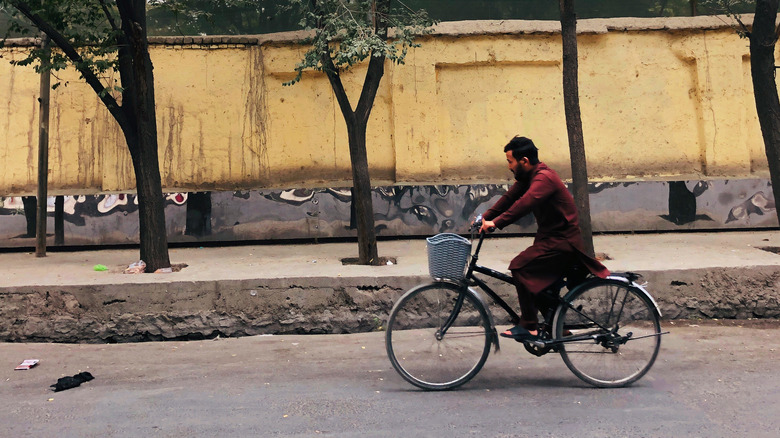The Untold Truth Of The Taliban
A militant organization that became prominent in the 1990s, the Taliban achieved popularity because its members promised to bring back control when Afghanistan was going through a period of uncertainty. According to the BBC, the word "Taliban" literally means "students" in Pashto. This is linked to the fact that the organization's members trained with the group's founder, Mullah Mohammad Omar, and were literally his students (via The Wall Street Journal).
What sets this group apart is that it insists on following an extremist approach by implementing its narrow interpretation of sharia law. The rules have been especially hard on women, who've been forced to live with a number of restrictions under Taliban rule. Additionally, nobody was allowed to play music or watch movies and television (via The Guardian). The Taliban was dominant in Afghanistan until 2001, when American troops invaded. Two decades later, it quickly came back to power as the U.S. withdrew from the country, per a deal signed between the Trump administration and the Taliban in 2020 (via the Associated Press).
However, things aren't straightforward. While reflecting on the organization's background, it is necessary to take into account several factors, such as the rise and fall of the Taliban, the kind of support it has received from other countries, its leadership structure, and more. Here's a glimpse into the organization's convoluted background.
The Taliban's origins can be traced to the 1990s
Afghanistan was in a state of despair as it tried to deal with the series of events that took place after the fall of the Soviet Union in 1991. Per NPR, the local government was in shambles, and guerrillas were busy fighting each other. Afghans didn't quite know what to do, and many refugees chose to leave the country at that point, finding shelter in neighboring nations like Iran and Pakistan.
Around this time, members of the Taliban started promising the public that they would fix the sorry state of affairs in Afghanistan. These "student-warriors" were determined to succeed and established their presence by taking over Kandahar in 1994 before annexing other parts of the country over the next couple of years. The group's big victory came when Kabul was overtaken by the Taliban in September 1996. By 1997, the group had officially renamed the country to the Islamic Emirate of Afghanistan (via CNN).
Several factors led to the formation of the group
It is incredibly hard to pinpoint one specific factor that led to the growth of the Taliban. Per the Council on Foreign Relations, the organization was formed by guerrillas who fought against the Soviets in the 1970s and 1980s. They weren't alone: the group was allegedly supported by Pakistan as well as the CIA in its early stages. There were also Pashtun fighters who joined from Pakistan's seminaries.
Again, the Taliban received the support it did because those were ugly times and people were looking for a way out. The Taliban promised a solution. Their founder was Mullah Mohammad Omar, a man who was described as a "reclusive leader," and avoided the spotlight at all costs (via CNN).
According to The New York Times, during the War in Afghanistan, the Taliban insurgency managed to find members and establish cells all over the country. Timor Sharan, a researcher and expert on Afghanistan, said, "...it's very decentralized, it has the ability for the commanders at the district level to mobilize resources, and be able to logistically prepare." That said, the members drew strength from Omar's leadership and universally recognized him as the head of the organization while he was alive.
The Taliban interprets Islam differently
The Taliban has always stood by sharia law. Even now, as it gets ready to govern Afghanistan once more, its members have stated in interviews that they will continue to work according to the law. Senior commander Waheedullah Hashimi told Reuters that democracy is out of the question. He said, "We will not discuss what type of political system should we apply in Afghanistan because it is clear. It is sharia law and that is it."
As per The Washington Post, sharia essentially means "the clear, well-trodden path to water." Interestingly, its interpretation isn't the same in different countries. Few governments do what the Taliban does, which is to deliver justice in the context of criminal acts using sharia law. The problem is that the group's implementation of the law can be too harsh, for women in particular. Back when the Taliban was controlling Afghanistan in the 1990s, women led restricted lives. They had to don burqas and ensure that they were fully covered whenever they left their homes. Plus, they weren't permitted to step out without a male guardian and couldn't attend school. Anyone who attempted to defy the Taliban could face a public beating or even execution.
Abdulaziz Sachedina, a professor at George Mason University who is well-versed in Islamic studies said, "There isn't anything in sharia that says, this is the way you run the state. Sharia law is far from the modern nation-state as we know it today."
Its founder was difficult to track down
The Taliban's founder, Mullah Omar, was always notoriously hard to locate. Per NBC News, he was secretive and was never a part of the limelight. It was reported in 2015 that the leader had passed away two years prior. Afghanistan National Directorate of Security spokesman Abdul Hassib Sediqi said at the time, "I can confirm that Mullah Omar is dead. According to our intelligence Mullah Omar has died in a hospital in Pakistan a couple years ago."
Nobody knew much about Omar. There were hardly any pictures of the man, who lost an eye on account of a shrapnel injury that he sustained while fighting the Soviet army in the 1980s. When he was communicating with other members, he would use couriers and didn't rely on conventional methods like cell phones and recordings. He wanted to ensure that he was not identified or traced. The Taliban's members said that Omar had suffered many personal losses because of the war against the Soviets and Americans. While he was easily one of the most notorious leaders in the world, nobody quite knew how to find him. He was believed to be living in Pakistan at the time of his death and was apparently a simple man with a close circle of friends.
Pakistan's role is a debatable topic
As per Human Rights Watch, Pakistan claims that it has never helped the Taliban in terms of providing military aid and has refused to take any kind of responsibility. However, the truth seems to be starkly different. Pakistan is believed to have supported the Taliban in many ways in the past. For example, the country allegedly financed the group's efforts and arranged training facilities for its members. It also provided ammunition and supplies.
As per the Council on Foreign Relations, Pakistan's Inter-Services Intelligence (ISI) remains in touch with the Taliban and assists them with financial aid, weapons, training, and more. However, the relationship between the two is complex at best, considering the fact that after the country faced pressure from the U.S., certain Taliban members were rumored to have been tortured by Pakistan. Currently, the nation is showcasing its support for the Taliban, but things are messy. It doesn't help that the group has started building relations with other countries like Russia, Iran, and China.
Their first major victory was in 1994
For the Taliban, a significant milestone was establishing its presence in the southern city of Kandahar by defeating its opponents in November 1994. Per Stanford University, this was a "surprise attack" that went pretty well for the group. After their victory, the Taliban were able to impress the public by weeding out corruption in the region and focusing on safety on the city's streets. In just two months, the group had managed to conquer 12 provinces, and by next February, it had at least 25,000 members fighting for its cause.
Also, it's believed that the Taliban benefitted from the support it received from the ISI in Pakistan. The group grew at an alarming rate: By 1996, the Taliban had managed to capture Kabul and proved that it wasn't going anywhere. Around that time, the country came to be known as the Islamic Emirate of Afghanistan, with Mullah Omar being named the head of state.
They were outcasts by 1997
Even as the Taliban was getting stronger within Afghanistan, it was getting a bad reputation internationally. According to Stanford, the Taliban was present in 90% of Afghanistan by 1998, but most countries were appalled by its decisions and chose to boycott it. Mainly, the group was heavily criticized for violating human rights on a massive scale.
In fact, just three countries — the United Arab Emirates, Saudi Arabia, and Pakistan — acknowledged the Taliban government. Within Afghanistan, the group also faced opposition from the Northern Alliance, which was headed by Ahmed Shah Massoud. They didn't see eye-to-eye on account of the fact they had significant "ethnic differences." The Taliban was largely composed of Sunni Pashtuns, and the Northern Alliance had ethnic Tajiks and Uzbeks. Additionally, the United Nations recognized the Northern Alliance instead of the Taliban, which led to more conflict between them. Of course, one thing that really made the Taliban outcasts on the world stage was that the group stood by Osama Bin Laden after 9/11 (via The Guardian).
Things got especially ugly after 9/11
The devastating September 11th attacks led to many consequences. According to Vox, the U.S. wanted the Taliban to give up Osama Bin Laden, the mastermind behind 9/11. The Taliban had a condition: They would only let a third country take the terrorist and hold a trial for him. The Bush administration was having none of it. The subsequent bombings led by the U.S. in Afghanistan meant that the Taliban was defeated in a relatively short period of time. They didn't have much going for them in terms of an air force, after all.
American troops entering Afghanistan meant that it was close to impossible for the Taliban to survive as a whole. It didn't die out completely, though, and stayed afloat in smaller groups. They were scattered across Afghanistan, and some vanished into the depths of Pakistan. The group maintained a low profile until the 2010s, working on rebuilding its finances through extortion as well as drug trafficking.
According to The Guardian, the Taliban's Mullah Omar was even warned by Saudi Arabian officials in 1998 that Bin Laden was up to something sinister and that it would be bad for Afghanistan in the future. He refused to pay heed to the warning and shot back, "How can you persecute this worthy man who dedicated his life to helping Muslims?"
They established a small presence in Qatar
As per the BBC, members of the Taliban privately chose Qatar as a place to hold negotiations with the West at the start of the 2010s. Of course, they were aware of the fact that the U.S. was keen to find a way to exit Afghanistan and leave in a peaceful manner. Qatar seemed like the right choice because it was perceived to be neutral. While the conversations didn't go as expected in the beginning, the Taliban did end up spending more and more time in Qatar, and some of its members moved to the country to represent the organization. Qatar agreed to host the Taliban as long as they promised to only use its Doha headquarters for peace talks.
Members of the Taliban who were in Doha indeed maintained a low profile and didn't draw attention to themselves. An Afghani diplomat remembered meeting someone from the Taliban at a shopping center. He recognized that the guy was from the group and tried to talk to him. He recalled, "...when he avoided disclosing information about himself I asked him, 'Are you from the other side?' He blushed and simply left." Afghan entrepreneur Zadran Darwesh commented, "They [members of the Taliban] live in Doha in comfortable homes all paid by the Qataris, who are generally nice people."
The Taliban has orchestrated numerous attacks in Afghanistan
The Taliban has been responsible for numerous terrorist activities over the years, particularly within Afghanistan. According to the Combating Terrorism Center, the Taliban has often issued open threats to Western countries for what they perceive as insults directed at Islam. They've also objected to the "military occupation" of Afghanistan.
In April 2017, members of the Taliban carried out a raid on an Afghan army base that led to hundreds of people being killed and hurt (via CNN). It was claimed that this was a revenge attack that was carried out after "pro-Afghan government forces" allegedly attacked a couple of members from the Taliban. Meanwhile, in January 2018, an ambulance bomb set off by the Taliban killed around 95 locals and injured many more in Kabul, per the BBC. A witness spoke about the attack, recounting that he was unsure about what happened at first and stepped outside his home, where he saw many dead bodies. He said, "It is very, very inhumane." Meanwhile, U.N. secretary general Antonio Guterres said, "Indiscriminate attacks against civilians are a serious violation of human rights and humanitarian laws, and can never be justified."
It took several attempts for the Taliban to seize control again
After 2001, the Taliban tried to re-establish their hold over Afghanistan for many years without much success. Establishing a presence in Qatar was one way to get closer to that goal, but it took many years before something concrete could be accomplished.
The group had a breakthrough in February 2020, when a peace deal was signed in Doha (via Stanford). As per this deal, the U.S. consented to ensuring that all American and NATO troops would leave Afghanistan in 14 months. Meanwhile, the Taliban said that it would make sure that nobody would use Afghanistan as a base to hurt the U.S. or its allies. Additionally, the group stated that it would move away from organizations like Al Qaeda. It took more than a year for the agreement to finally be signed, according to The New York Times.
Per the Associated Press, then-U.S. president Donald Trump chose to remain optimistic when the deal was signed, noting, "...we think we'll be successful in the end." While the earlier assumption was that this would lead to peace within Afghanistan, things backfired when the Taliban started attacking government forces in 2021. President Joe Biden defended his decision to stick to the deal, saying, "The choice I had to make, as your president, was either to follow through on that agreement or be prepared to go back to fighting the Taliban in the middle of the spring fighting season."
The Taliban is greatly feared in Afghanistan
After Kabul fell to the Taliban in August 2021, locals were gripped with a sense of terror as they tried to come to terms with their new reality. According to the Associated Press, people panicked quickly as the news spread. A local woman said that she was shocked. She asked, "How can it be possible for me as a woman who has worked so hard and tried to learn and advance, to now have to hide myself and stay at home?"
The Taliban acted rather quickly once the U.S. troops started exiting the country. In a few days, they took over two-thirds of Afghanistan. Meanwhile, many Afghans started leaving the country in a panic. Another Afghan resident, a women's right activist said, "I feel we are like a bird who makes a nest for a living and spends all the time building it, but then suddenly and helplessly watches others destroy it."
Per The New York Times, several female journalists were quickly dismissed from their jobs. One lamented that there was nothing left for the next generation. Many Afghans were anxious that they'd be forced to go back to the past — fears that weren't unfounded: In some parts of the country, women were soon told that they could not step outside their homes without a male guardian upon the Taliban takeover. Posters with female models were quickly spray-painted, as per Business Insider. Women began to wear burqas in public again.
The Taliban try to rebuild
The Taliban doesn't want to be criticized. After retaking Afghanistan, the group attempted a massive PR campaign in a bid to reassure locals that it had changed its ways. According to NPR, it carefully prepared for its media campaign and issued statements in several languages and on various platforms. The Taliban wanted the public to believe that Afghanistan will be stable and peaceful under the group's rule. According to Reuters, the organization stated that it wanted to ensure that it maintained cordial relations with other nations.
Per The Washington Post, a spokesperson from the group, Zabiullah Mujahid, said, "We assure the international community that there will be no discrimination against women, but, of course, within the frameworks we have." Many were skeptical of the group's claims, even though Mujahid mentioned that women will be able to study and hold down jobs. He added, "will be very active in society but within the framework of Islam" (via Reuters). Meanwhile, the European Union announced that it would only recognize Afghanistan under the Taliban rule if women were respected and human rights upheld.
